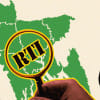Government starts to nurture the fledgling RTI regime

In recent weeks, two important government ministers—Law Minister Mr Anisul Huq, and Information Minister Mr Hasan Mahmud—have given vocal support to a fuller implementation of our national Right to Information (RTI) Act. We were encouraged to see this support, given that we've written recently about the bounty that this law provides for our country.
While their statements were not widely reported in the media, mainly because the law draws little public interest, such support from ministers may help influence public perception. This law is a tool to make Prime Minister Sheikh Hasina's policy of "zero tolerance to corruption" a reality. Citizens can play a complementary role to augment the government's efforts to fight corruption.
Every renewal of government's commitment to implement the law would do two things. It would remove citizens' fear about upsetting the government for seeking information of a probing nature from public offices. And it would alert public officials that the government really wants them to abide by the requirements of the law, without any fear or favour. Without increased RTI requests, the efficacy of the law would largely remain untapped and there is a danger that it may gradually turn into a paper law. An annual figure of 7,000 RTI requests in Bangladesh compared to 60 lakhs in neighbouring India doesn't augur well for our country; given that our performance is better on so many fronts, let us enter some friendly competition on the use of RTI as well.
As stated in our earlier columns, the Prime Minister's Office (PMO) appears to have a good record for responding to citizens' RTI requests. We encourage the PMO to remain equally forthcoming even if requests become more sensitive and probing. The leadership role of the prime minister in this regard would go a long way to set examples for others to emulate.
The law minister spoke at a seminar called "Anti-Corruption Drive and the Success of the Leadership" on February 18. He said: "RTI can ensure free flow of information and can play an important role to bring transparency, ensure accountability and reduce corruption." He underlined the need for "taking integrated initiatives, including making people more conscious about the right to information law and its full implementation for prevention of corruption." We sincerely hope that the message would go down well with all public officials.
The information minister for his part spoke at a seminar called "Use of RTI for Investigative Journalism" on March 6. Among other things, he said: "Awami League believes in peoples' power. That's why it welcomes criticism. There can be no pluralistic society without criticism and debate. That is why Awami League adopted the RTI Act in 2009." This indeed is an indication of strong support for the Act and coming from the information minister himself, whose office plays a key role in implementing the law, it augurs well for the future of RTI in Bangladesh.
What are the next steps both ministers could take? The law requires that the RTI requests are addressed to duly appointed Designated Officers (DOs). Both ministers should ensure that the offices covered by their respective ministries would at least appoint the DOs and make them known through their websites and notice boards. We know that many prospective RTI applicants have to give up their efforts in utter frustration because of non-availability or uncertainty about the names of the DOs. What can citizens do if DOs are not appointed or changes in DOs are not properly communicated? A common gripe of RTI-users against the Information Commission (IC) is the latter's unwillingness to consider complaints if the DOs were not properly addressed in the first place. Let's remove this simple impediment to the application of the law.
Some lawyers have told us that one of their biggest problems is to obtain the names of DOs of legal bodies. They said, for example, that there are no DOs at the Supreme Court, at the Attorney General's office, Metropolitan Magistrate's Court, Nari-Shishu Nirjaton Daman Tribunal, Labour Tribunal—to name just a few. This should not be the case 10 years after adoption of the Act. To whom should citizens send their RTI requests? They would welcome corrective measures from the minister.
As the key government ministry with a specific link to the Information Commission (IC), the Information Ministry could help in another important way. RTI practitioners often express concern about the selection process of the three Information Commissioners who serve as guardians of the law. The law requires a transparent process for their selection, which is overseen by the Information Ministry. A selection committee prescribed by the law has foreseen the inclusion of a judge from the Appellate Division, two MPs chosen by the Speaker (one from the ruling party and the other from opposition), the Cabinet Secretary, and an eminent civil society personality with experience or background in journalism. As the process is not publicised, it is not known whether these requirements are followed. This raises inevitable questions about a preponderance of bureaucrats, with a penchant for adopting bureaucratic positions, among successive Information Commissioners in the last ten years. Transparency in the selection of commissioners appointed to oversee the application of a transparency instrument by citizens must be a basic requirement of the system.
Now for the Information Commission itself. As a guardian of RTI law, which seeks to empower citizens vis a vis the government, it is essential that the commission is perceived as citizen-friendly. This, unfortunately, is not always the case.
In recent months, a number of staff members of the IC have reportedly visited some northern districts where they are said to have enquired about motives of RTI applicants, raising doubts about why and at whose behest they submitted RTI requests. Such questions obviously dampen the spirit of the applicants and even frighten them. It is often forgotten that RTI law provides no scope for asking why a citizen seeks any information which is not prohibited under the law. Citizens seek information as of right and not as favour. Unfortunately such questions are also asked at complaint hearings of the IC.
Another concern often expressed by RTI enthusiasts is the fact that the IC has a stringent policy on allowing observers at its complaint hearings. Citizens who have a legitimate interest in observing how a law adopted for their empowerment is applied in practice are barred from doing so. Such a non-transparent practice doesn't bode well for an agency mandated to oversee a transparency regime. In neighbouring India, where a much larger number of hearing takes place, the proceedings are open to the public except when the commission decides to examine records in confidence.
There are, however, encouraging reports in recent days from RTI applicants in the northern districts that they are receiving relatively better response to their requests than in the past. They have also been given assurances by senior district officials that offices under their jurisdiction would be more forthcoming in responding positively to RTI requests, if permitted under the law. This is indeed a positive development in the face of continuing reluctance of many public officials to live up to their responsibilities under it. Surely a closer interaction between citizens and public authorities can enhance transparency and accountability in governance, strengthen democracy and reduce corruption.
Shamsul Bari and Ruhi Naz are Chairman and Project Coordinator (RTI section) respectively of Research Initiatives, Bangladesh (RIB).
Email: [email protected]

 For all latest news, follow The Daily Star's Google News channel.
For all latest news, follow The Daily Star's Google News channel. 








Comments